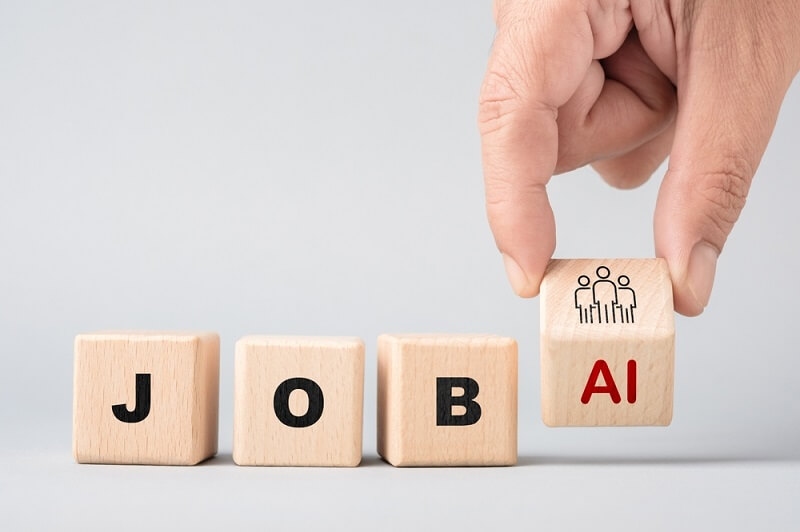
Our world is more dynamic than ever before, and technology is transforming the manner in which we live, work, and relate. The core of this change is artificial intelligence (AI), which impacts the business sector, affects job applications, and resets skills. It excites lots of people, and makes some worried about what this implication can have on their future. This blog will discuss how AI will affect jobs, why the job market is changing at a high rate, and how workers in the USA can save themselves as well as look ahead.
Due to the sudden increase in the use of AI tools, automation technologies, and smart machines, people have begun to work differently. This part presents the general effect of AI on employment and the reason why this issue has been so significant lately. In factories, offices, and so on, AI is changing jobs and establishing new demands on employees. We disaggregate various sides of this change below.
Artificial intelligence is appearing in all places, on the one hand, chatbots in customer service, on the other hand, advanced medical instruments. AI has now been adopted by many companies to save money, complete tasks faster, and reduce mistakes. This will imply a reduced number of monotonous functions of human beings and a greater scope of creativity, communication, and decision-making.
There is a need to experience various emotions during technological change. Other employees feel elated since AI has the potential to simplify their work. There are other people who are scared of being fired or substituted. Such an emotional dilemma is among the largest motivations for why individuals desire to comprehend AI and work in the future.
It is not only that AI alters the way we do things, but also the way employers want us to do so. Nowadays, it is recommended to digitalize and master skills, earn them within a short period, and be ready to get acquainted with new tools. A lot of enterprises seek employees who will not impede technology but will cooperate with it.
On a Related Note: How to Identify and Avoid Toxic Work Environments Early?
The job market in the USA is transforming at a pace we’ve never seen before. This section introduces how AI and the job market are connected and why updating skills is becoming necessary. The shifts are big, but they also bring new career paths we couldn’t imagine years ago.
While some jobs are becoming automated, many new roles are being created. For example, companies need AI trainers, data analysts, automation supervisors, and digital workflow experts. These jobs didn’t exist two decades ago, but today they’re in high demand.
Soft skills like communication, empathy, and teamwork matter more now than ever. AI can calculate and analyze, but it cannot fully understand human emotions or build trust. Jobs that require human interaction — nursing, caregiving, teaching, mental health support — continue to grow.
Some industries are adopting AI faster than others. For example:
These changes affect job roles, skill requirements, and even salaries.
In Case You Missed It: How to Beat AI Interview Tools: Tips for Video & ATS Scans
This section highlights how AI is helping workers, businesses, and industries grow. The introduction sets the tone for optimism and possibility. Many people don’t realize how beneficial AI can be when used wisely.
AI takes over repetitive, boring, or physically demanding tasks. This reduces workplace injuries and frees workers to do more meaningful tasks. For example, warehouse robots can handle heavy lifting while employees focus on inventory management and customer support.
Instead of replacing creativity, AI often inspires it. Designers, writers, marketers, and artists use AI to brainstorm ideas, test new concepts, and speed up the creative process. It helps them think bigger and experiment without fear of failure.
Small companies can now use AI tools that were once only available to big corporations. This includes marketing automation, virtual assistants, and customer data analysis. As a result, small businesses can compete more effectively in the market.
Also read: Upskilling vs. Reskilling: Stay Competitive in Your Career

Although AI offers many benefits, it also brings challenges. This section prepares readers emotionally for the difficult side of change. Being honest about the negative impact of AI on jobs helps people prepare and act.
The first jobs to be automated are those ones that follow identical processes on a daily basis. This involves entering data, simple work in accountancy, and in an assembly line. These jobs might require reskilling of workers in the process of remaining competitive.
Artificial intelligence could make the gap between high-skill and low-skill employees bigger. Individuals with excellent technical expertise can earn higher wages, whereas individuals without education or training may not do well. This presents a challenge to policymakers and communities.
It is emotionally exhausting not to know whether your employment is secure or not. Most employees are worried about the future, and the outcomes of the worry are in the poor quality of work, psychological conditions, and fulfillment of the occupation. It is noteworthy that these are normal feelings that should be acknowledged.
This segment shows the readers how to remain prepared for the changes in the future. Having the correct mindset and the ability will allow the employees in the USA to not only survive in an AI-driven economy but also prosper in it.
Days of learning one thing and having a lifelong job are long gone. Employees have to learn on an ongoing basis to accommodate the emerging tools and technologies. Even mere online courses, workshops, and certificates can help a lot.
The power of AI could not substitute human emotions, judgment, and experiences. Occupations that involve compassion, problem-solving, leadership, and narration will not go away. To enhance these skills, the workers become more flexible.
One of the most discussed topics of our era is the contribution of AI to jobs. Employees in the USA are encountering giant transformations, and they are also finding new frontiers. Artificial intelligence is transforming the professional employment sector, motivating emerging competencies, and driving sectors ahead. Sure, there exist some difficulties, but there are more positive effects that will make the future even better. The trick is to remain inquisitive, be open to learn, and realize that a human being will always have a church in the job market. AI can alter the jobs, yet not passion, emotion, and creativity.
This content was created by AI